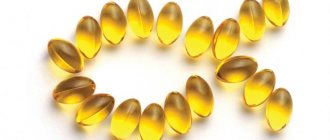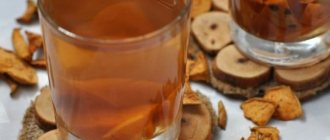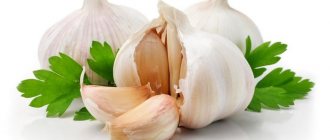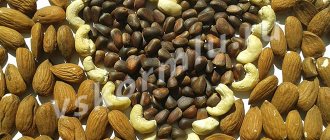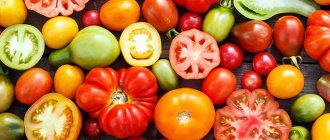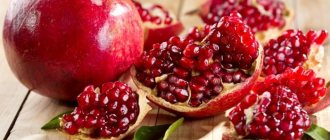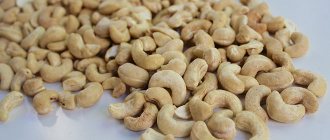Nutrition for a nursing mother - the opinion of Dr. Komarovsky
The diet of a breastfeeding mother should consist of a balanced and complete set of foods. The baby’s well-being, development and health for years depend on what and how a nursing mother eats. The famous doctor E. Komarovsky in his works gives nutritional advice for nursing mothers.
Eliminate from diet
All advice from a famous pediatrician is advisory in nature, however, in matters of nutrition, the doctor adheres to a position of perseverance. First of all, foods that provoke allergies are excluded: citrus fruits, chocolate, strawberries, eggs, seafood. The mother, especially in the first days and weeks, should carefully monitor the baby’s reaction to the new product she has eaten. If you have doubts about any product, the doctor advises you to first eat a small amount of it and, depending on the child’s reaction, decide whether it is worth including it in the diet in the future.
All products that can cause milk to change its taste and smell and become unpleasant to the baby are excluded from the diet. This group includes sour, salty, spicy dishes, and strong-smelling seasonings. A number of foods (legumes, cabbage, carbonated drinks) have a bad effect on the baby's intestines. Their consumption can increase gas production and in some cases cause diarrhea.
To digest fatty foods, the body requires additional effort; with increased fat content of breast milk, it is difficult for the baby to suck it out, and for the mother to express it. Therefore, the doctor does not recommend saturating food with fatty foods (fat sour cream, butter, pork, nuts), which will make milk more nutritious, but also difficult to digest. At the same time, vegetable fats are given preference over animal fats.
Diet of a nursing mother
A mother’s nutritious diet is the main source for the child to receive the substances necessary for development.
What to eat and drink:
- Meat and fish (low-fat);
- Dairy and fermented milk products (milk, fermented baked milk, kefir, etc.);
- Vegetables and fruits: cherries, watermelon, grapes, apples, pears, apricots. We also read: fruits during breastfeeding and vegetables during breastfeeding;
- Dried fruits (dried apricots, raisins) and compote made from them;
- Greenery;
- Green tea;
- Not dried or salted fish;
- Stewed, baked and boiled dishes.
You should not eat or drink:
- Fatty dishes (including fatty broth);
- Coffee;
- Spicy, salty, sour dishes;
- Smoked and fried foods;
- All types of conservation;
- Cocoa and cocoa-containing products (sweets and chocolate);
- Sweets containing buttercream;
- Peas;
- Citrus fruits (oranges, tangerines, lemons);
- Baking with yeast;
- The berries are red;
- Mushrooms.
The daily diet should contain at least 0.5 kg of fresh fruit. If the mother is slim enough and can afford it, Komarovsky recommends eating a plate of semolina at night. All products that a mother accustoms her baby to during pregnancy and breastfeeding will subsequently be accepted by the child with pleasure, because these are familiar foods.
Dietary recommendations
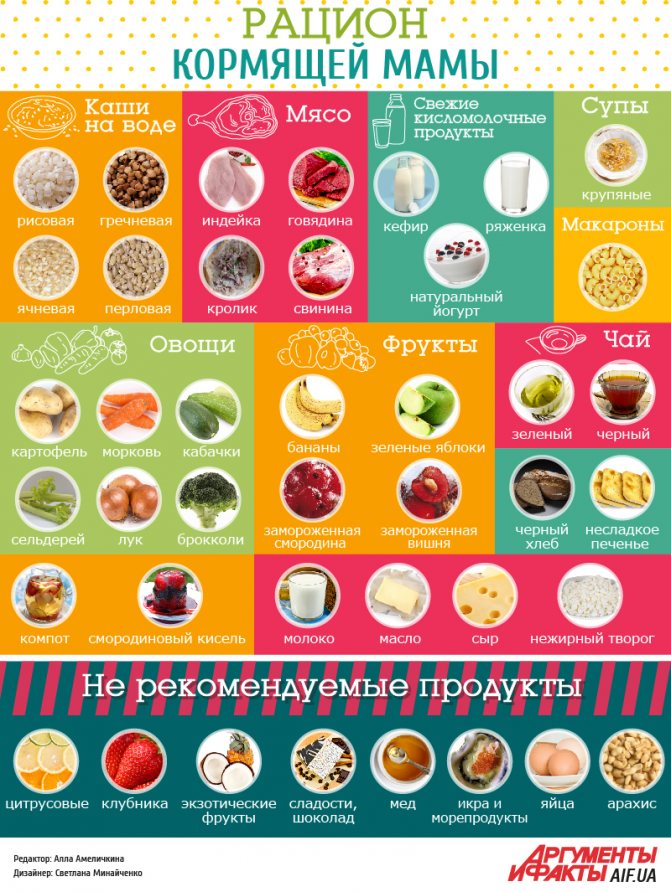
Read a detailed article about nutrition for a nursing mother here
A well-known pediatrician advises to be very careful about the presence of exotic fruits or imported products in your diet. Such food is obviously unknown to our digestive system and its absorption by the body may be incomplete. The occurrence of stress on the liver or pancreas negatively affects breast milk.
The doctor gives some more advice:
- Avoid overeating. It would be healthier to undereat a little;
- If you have an obsessive desire to eat something forbidden, you can “discourage the desire” with a tiny amount of this product;
- Doubts about the product should lead to complete rejection of it;
- You should not eat at night;
- If circumstances forced you to drink alcohol, then a little red wine is acceptable;
- Taking vitamin complexes should be regular.
Beverage issues
Dr. Komarovsky speaks quite clearly about eliminating the issue of additional forced drinking for nursing mothers (although many experts claim that large amounts of drinking do not affect milk production in any way, many nursing mothers are convinced of the opposite from their own experience). In this matter, the pediatrician adheres to the principle of naturalness as much as possible: if everything is fine with the mother and baby and there is enough milk, then there is no need to drink anything additional, beyond the woman’s desire.
If there is not enough milk , then after each feeding the mother needs to replenish lost fluid and drink 300-500 ml of liquid. Night feeding should not be an exception, so it is better to prepare a drink in advance.
Preferred drinks:
- Sweet green tea with milk;
- Dried fruits compote;
- Apple, grape, carrot juice (remember moderation);
- Boiled and baked cow's milk, fermented milk products (fat content 2.5% and below).
Various drugs are known, medicinal (nicotinic acid, pyrroxane, apilak) and food (nuts, beer, yeast), which have the property of increasing lactation. However, a well-known pediatrician advises not to overestimate their importance.
Dr. Komarovsky’s principles have gained popularity for their simplicity and closeness to nature; they are advisory in nature, based on the natural needs of a nursing mother and baby.
Do you want to be the first to read our materials? Subscribe to our telegram channel
Champignons for a nursing mother: rules of consumption and recipes for delicious healthy dishes
It is known that it is not recommended to consume mushrooms while breastfeeding. The fact is that such a product is difficult to digest and difficult to digest in the body, often causing digestive problems and problems with stool, sometimes causing food allergies and even poisoning. Pediatricians do not recommend consuming mushrooms for diseases of the stomach and liver, nursing and pregnant women, as well as children under 5-7 years of age.
The greatest danger is caused by toxic and poisonous mushrooms, which threaten severe intoxication. Please note that even edible mushrooms accumulate harmful substances. Therefore, you should not eat mushrooms that were collected near the highway or near factories. Read more about the benefits and harms of mushrooms during lactation here.
However, if you follow safety, selection and preparation rules, you can sometimes eat a small amount of mushrooms while breastfeeding. The safest are oyster mushrooms and champignons. But it is better to avoid eating porcini mushrooms, milk mushrooms, chanterelles and boletus until the end of lactation. Let's take a closer look at the benefits and rules for using champignons.
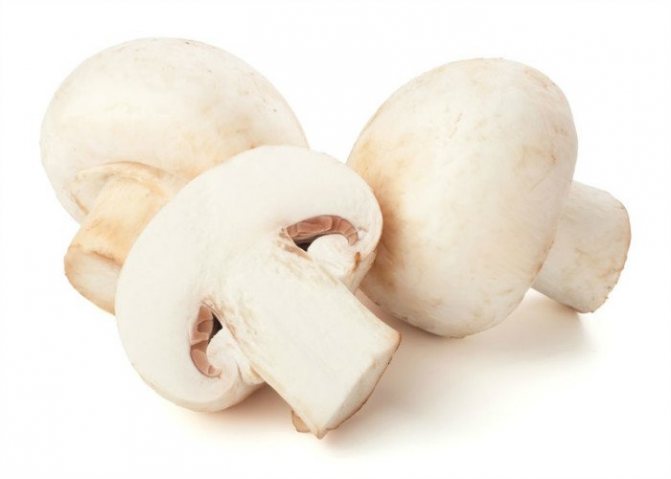
Beneficial features
Champignons are a tasty and healthy product. The big advantage of these mushrooms is that they do not absorb harmful elements from the soil. In addition, they are easier to digest. Champignons are digestible up to 80-90% and have the following beneficial effects:
- Champignons contain a large amount of liquid, which has a beneficial effect on the functioning of digestion and the body as a whole, prevents dehydration and improves material metabolism;
- The fiber in the composition cleanses the body, removes heavy metals and toxins;
- Strengthens memory and stimulates brain function;
- Stabilizes the activity of nerve cells, relieves nervous tension and excitability;
- Increases visual acuity;
- Helps with constipation;
- Maintains body tone and prevents excess weight;
- B vitamins improve the condition of hair and skin, relieve headaches and restore the body after serious physical exertion, illness, childbirth and various operations.
Champignons can easily replace meat during a diet. This low-calorie product is often included in the diet menu, because 100 grams contain only 27 kcal. It does not contribute to the appearance of excess weight and at the same time saturates the body with the necessary energy and protein. Since there is no sugar or dangerous fats, champignons can be safely consumed by people with diabetes.
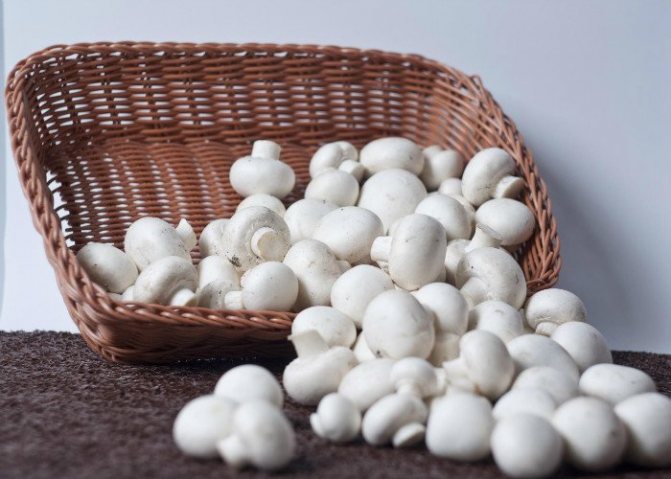
Recommendations for the use of champignons during lactation
- Eat mushrooms grown in special artificial conditions (on farms, plantations, etc.) and sold in stores. Mushrooms, collected with your own hands or bought from your grandmother on the street, can be toxic and dangerous;
- For the first time, try mushrooms at least 4 months after the baby is born and in an amount of no more than 5 pieces. Observe the baby's reaction for two days. If there is no negative reaction, champignons can sometimes be eaten in small portions;
- Be prepared for negative consequences for the baby, since the baby’s body is still very weak, and digestion is just getting used to new conditions. In this case, exclude mushrooms from the diet until breastfeeding is completed. In case of severe poisoning and prolonged allergy symptoms, consult a doctor!;
- Eat only boiled, stewed, and in rare cases fried mushrooms. Be sure to exclude pickled and salted champignons from the menu, as they are very dangerous for small children!;
- Do not eat mushrooms if your baby is prone to allergies or already has a food allergy to any product;
- Champignons should not be eaten if you have problems with joints and cartilage, diseases and sluggish functioning of the gastrointestinal tract, disturbances in the functioning of digestion and nausea, frequent bloating and diseases of the pancreas;
- Buy only fresh champignons. Do not eat frozen or dried mushrooms!;
- Be sure to heat treat the product. Such food is easier to digest and digest, reducing the risk of a negative reaction from digestion. Raw and half-raw champignons will lead to serious problems!;
- Use only young champignons with a film under the cap. Before cooking, carefully select, wash and clean mushrooms. For better absorption, it is better to cut the product into small pieces;
- Don't overeat! The daily allowance of champignons for nursing is 50 grams of a ready-made dish, the weekly allowance is 100 grams. However, it is not recommended to eat mushrooms during lactation more than 1-2 times a month.
Selection of quality products
The main task of a nursing mother is to choose the right products. The cap of the edible young Champignon is white or slightly pinkish. If the caps are dark, you should refuse the purchase: the product has been lying on the counter for too long or was collected overripe.
High-quality fruiting bodies have a dense structure; in soft specimens the process of rotting has already begun, they are dangerous to human health. The pulp of ripe Champignon exudes a pleasant mushroom aroma. If sour notes are detected, the time for picking the mushrooms was chosen incorrectly or they were stored in the store without observing sanitary standards.
165
Champignons during breastfeeding (BF): is it possible or not, rules for preparation and consumption
You can eat champignons while breastfeeding - most doctors adhere to this point of view. But to prevent mushrooms from causing harm, it is necessary to study in detail the rules for their use and safe recipes for nursing mothers.
Can a nursing mother eat champignons?
As a rule, during breastfeeding, doctors recommend avoiding any mushroom dishes. Eating mushrooms always risks poisoning, even if the fruiting bodies are completely fresh, collected in a clean forest and carefully processed.
However, champignons when fed are an exception to the rule. They are considered the safest for humans; the fruiting bodies that are sold in stores are even grown on special farms. Thus, the product does not receive any harmful substances from the soil during its development and, in fact, cannot pose a danger.
There is no need to give up the product during breastfeeding. But it must be used with caution.
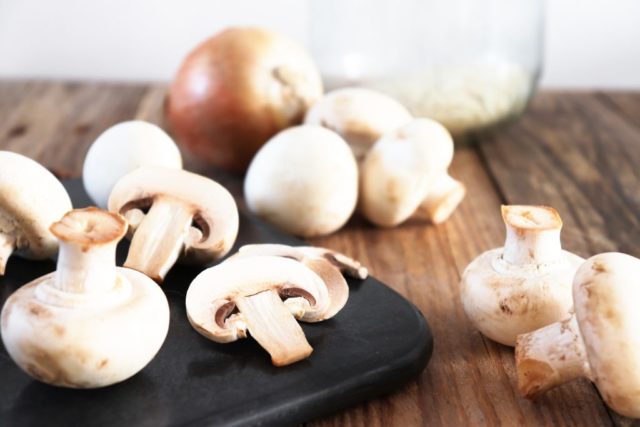
Champignon caps are the safest for breastfeeding
What are the benefits of champignons during breastfeeding?
Young mothers value champignons for their nutritional value and pleasant taste. But this is not the only benefit. The product has valuable properties and, when used wisely, is capable of:
- maintain the correct water-mineral balance in the body due to the high fluid content in the pulp;
- improve metabolism and intestinal motility;
- remove waste and toxins from the body;
- boost immunity thanks to a large number of antioxidants in the composition;
- prevent vitamin and mineral deficiency.
Komarovsky’s opinion on taking champignons for breastfeeding
The famous children's doctor Komarovsky believes that in general the product is very useful and should definitely be present in a woman’s diet. But regarding breastfeeding, the doctor is quite categorical; he claims that even safe mushrooms should not be consumed until the end of the feeding period. According to Komarovsky, even store-bought mushroom products can pose a danger to an infant, because it is impossible to 100% guarantee their quality and safe growing conditions.
Although the opinion of the famous doctor deserves attention, nursing mothers themselves often disagree with Komarovsky’s opinion about champignons while breastfeeding and believe that it is possible to take mushrooms.
When can I have champignons for breastfeeding?
Despite their safety, champignons remain prohibited during the first month of breastfeeding. You can add them to the diet for the first time when breastfeeding only after 4 months of the baby’s life.
In this case, it is necessary to take into account the characteristics of the infant’s body and its individual reactions. If a child is generally prone to food allergies, often suffers from colic, or has congenital digestive ailments, the introduction of mushrooms to the menu during breastfeeding should be avoided.
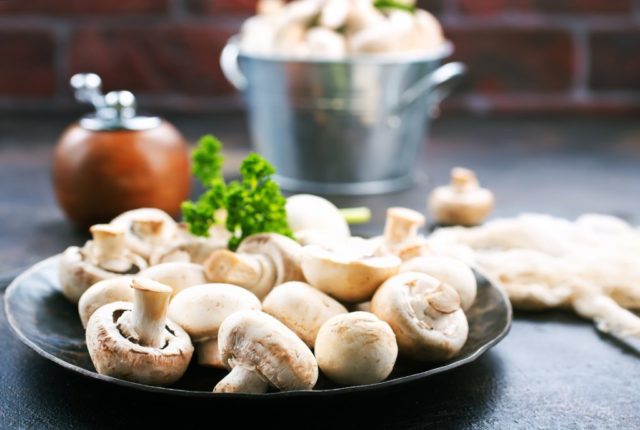
The product cannot be introduced into the menu in the first month after childbirth.
What champignons can a nursing mother eat?
Champignons can not be consumed in all types during breastfeeding. When breastfeeding, young mothers should give preference to boiled, stewed or fried mushrooms; these processing methods are the safest.
It is strictly forbidden to consume salted and pickled mushrooms, as well as canned food, while breastfeeding. Cold mushroom preparations in jars contain too much salt and spices, this will negatively affect the composition of breast milk and lead to colic in the baby. In addition, it is salted and pickled fruit bodies that can cause dangerous poisoning, even death.
As for whether a nursing mother can fried champignons, the answer will be negative. Such mushrooms contain an increased amount of oil and are difficult to digest food during breastfeeding.
In what form should it be included in the diet?
Is it possible to have champignons while breastfeeding? For cooking, it is best for a woman to use fresh mushrooms, but not dried or frozen. They can be included in salads, casseroles, cutlets, soups, vegetable stews and other dishes.
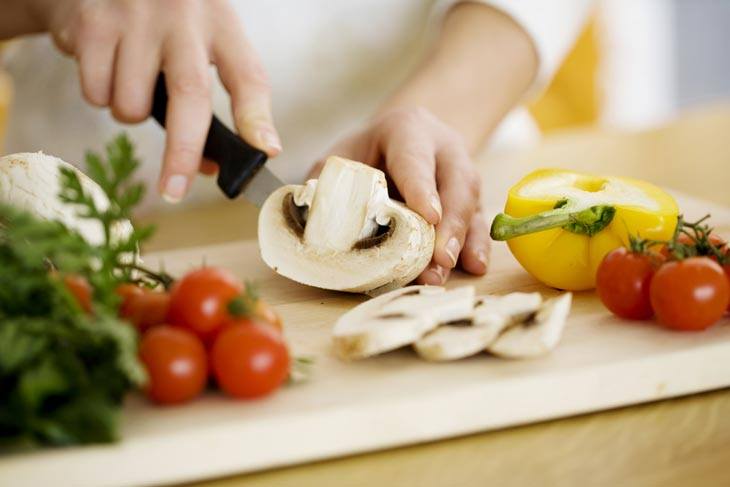
For preparation, you need to consider products that do not contain potentially dangerous ingredients. After all, food should not cause allergies in a nursing mother and child. To dress salads with mushrooms, you can use sour cream or yogurt instead of mayonnaise.
It is forbidden to include not only raw, but also canned or fried champignons in food. The pickled product contains hot spices and vinegar. Canned food may contain botulism bacillus, which negatively affects the nervous system. Bacteria can enter the baby's body through breast milk and lead to undesirable consequences.
Can a nursing mother eat champignons and why? It is not recommended for a woman to consume them fried for the following reasons:
- Oil makes the dish quite high in calories, so it ceases to be dietary.
- During the cooking process, nutrients are destroyed.
- When cooking, oil components turn into dangerous compounds.
- Fried champignons are more difficult for the body to digest and can therefore cause indigestion.
Dried and frozen mushrooms are generally not dangerous to the body, but contain the least amount of valuable substances.
The benefits and harms of champignons during breastfeeding
There are many rules and restrictions in the diet of nursing mothers - all of them are fair and did not arise out of nowhere. Mushrooms are healthy and nutritious, but are too difficult to digest, so they are prohibited during the lactation period, but there are exceptions to the rules. Mushrooms such as champignons can be consumed in small quantities while breastfeeding.
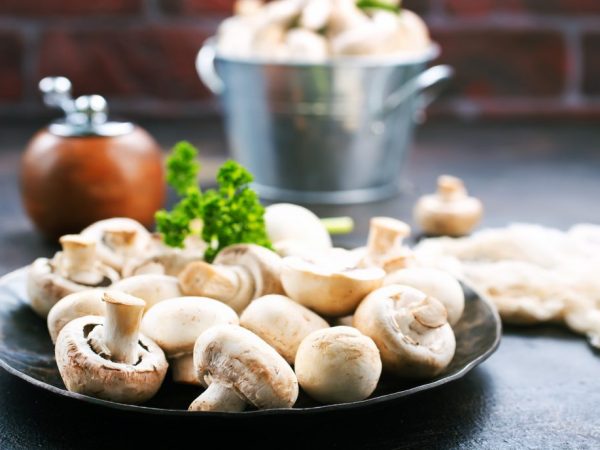
The benefits and harms of champignons during breastfeeding
Contraindications
There are many contraindications regarding the use of champignons during the lactation period. A nursing mother can start eating champignons only with the approval of a doctor and no earlier than 3 months after giving birth. Over the course of 3 months of life, the baby develops a digestive system capable of accepting heavier elements in mother’s milk. Mushroom dishes are contraindicated when fried or pickled.
Mushrooms should not be consumed in the following cases:
- mother: gastrointestinal disorder, constipation, kidney problems, gall bladder;
- child:
- abnormalities in the development of the gastrointestinal tract, liver, kidneys, cardiac system;
- infant diathesis;
- negative reaction from the gastrointestinal tract to meat and dairy products.
Use of mushroom products in the diet
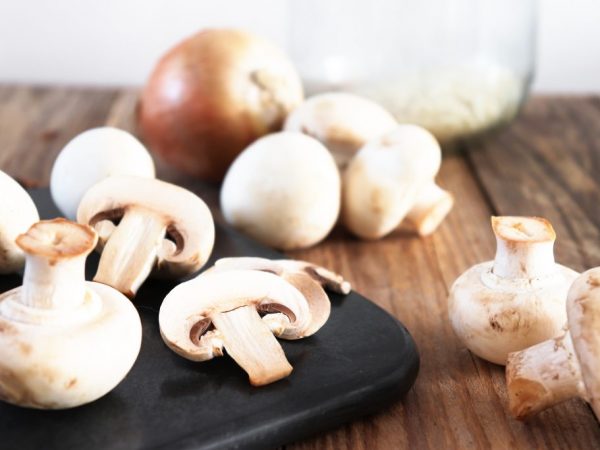
Mushrooms must be chewed well
The use of Champignons for breastfeeding is complicated by the presence of chitin, which impedes digestibility. This component performs supporting functions, which allows it to protect cells. Chitin is closely bound to protein, which makes it difficult to digest during the postpartum period. In order for the amino acids obtained from protein to work correctly, the product must be thoroughly chewed or crushed.
An alternative method is drying. It is better to use only hats. They need to be dried in the sun and ground into powder. It is then used to prepare soups and various sauces.
Dr. Komarovsky advises not to deny yourself mushroom dishes, but to consume them in moderation while breastfeeding. In 1-2 months after the birth of the baby, such products are strictly prohibited. The mother needs to restore balance and balance the diet by studying the child’s reaction to the products. At 1 week of a baby’s life, vegetable soups, low-fat fermented milk products, and long-lasting cookies are acceptable. From the first month, meat broths are gradually introduced.
Mushroom dishes in the form of soup or sauce are gradually introduced at the 3rd month of the baby’s life. The first time mushroom products are consumed in the morning (no more than 100 g). The baby's reaction to new products should be monitored for 24-48 hours from the moment of consumption by the mother.
If a child experiences certain reactions, it is important to immediately stop eating mushrooms and consult a doctor.
- bloating;
- flatulence;
- vomit;
- refusal of milk;
- changes in stool color;
- restlessness.
Champignon mushrooms during breastfeeding: is it possible or not?
When a child is born, mothers have to deny themselves many things: sleep, free time and food. But sometimes you really want to eat something tasty without harming yourself or the baby who is feeding on breast milk. Mushrooms are a product that should be consumed with caution. The article is devoted to whether it is possible to eat champignons while breastfeeding.
Beneficial features
Champignons will help protect the mother’s body from the harmful effects of bacteria and fill it with vitamins B, D, E. Eating them reduces the possibility of constipation. Champignons will help fill the lack of iron, magnesium, potassium and zinc that may occur during breastfeeding.
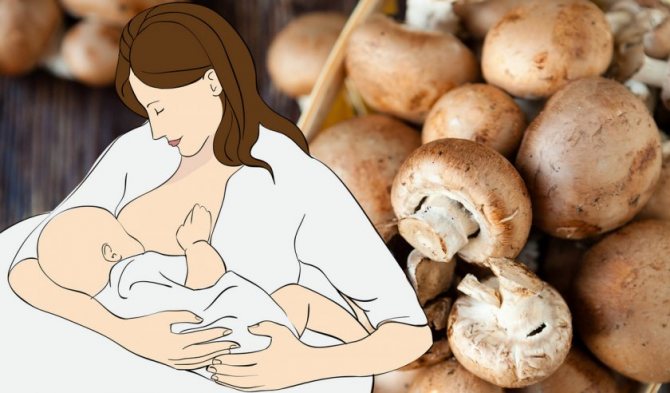
Pantothenic acid will relieve fatigue and reduce the effects of stress, which will also help reduce the risk of postpartum depression. It is also important that champignon is a dietary product (100 g contains only 27 kcal). It will keep your weight unchanged and tone your muscles.
Product selection
It is not recommended to collect champignons yourself . Firstly, there is a possibility of confusing them with toadstool, and secondly, even edible mushrooms that grew in the wild contain toxins that are contraindicated for mother and baby.
It is better to buy mushrooms that have grown under artificial conditions . But even here you need to be careful and check each copy well. The fruit body should be fleshy, the cap should be white or pink. If you notice that the cap is dark in color or stained, you should not take this product.
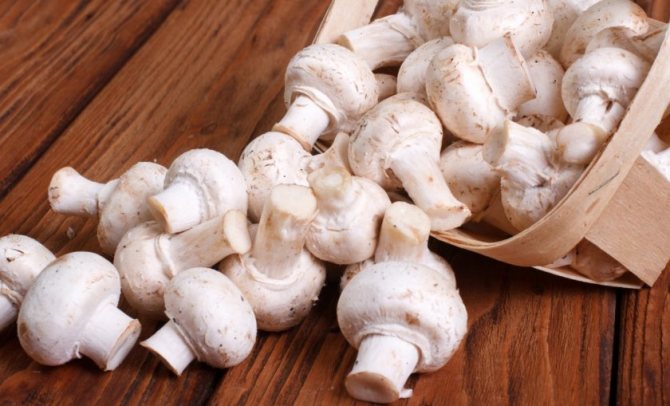
You need to smell the mushrooms. If the aroma is sour, then you can no longer buy them. You should not take specimens that are slippery to the touch. Look under the cap - there is a film that connects it to the stem. If the film is in place, it means the mushroom is young and fresh. This is the best choice.
Allowed cooking methods
Mushrooms are a very difficult product for the body, especially for a baby, so it is better for nursing mothers to eat it for the first time when the baby is 4–5 months old. The product can be eaten stewed, baked, boiled and only occasionally fried. It is better to avoid canned products. It is also undesirable to eat frozen mushrooms.
Restrictions
Any product should be treated with caution and added to the diet little by little. You can have no more than 50 g of mushrooms per day and it is better to add them to puree soup or combine them with vegetables. If no negative reactions follow after eating it, you can add champignons to your diet again.
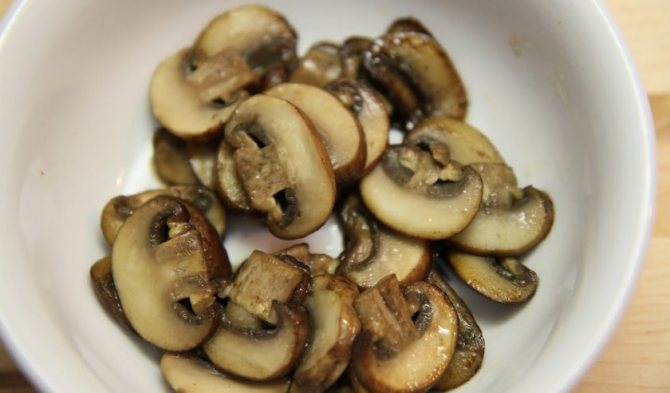
But remember that you can eat no more than 100 g of product per week, mushrooms can be consumed no more than twice per month.
Beneficial features
Champignons are especially popular. They have long been cultivated and grown on an industrial scale, which makes it possible to buy quality products without fear of being poisoned by poisonous counterparts. They are easier to digest than their forest counterparts. The digestibility of mushrooms is 80-90%.
- high moisture content allows you to maintain acid-water balance and improve metabolism;
- the fiber content allows you to satisfy the feeling of hunger for a long time and provide the body with the necessary amount of carbohydrates to maintain tone;
- proteins contained in mushrooms help quickly remove toxins from the body, actively participate in metabolic processes, cell construction and regeneration;
- antioxidants help improve immunity, which is especially important for nursing mothers;
- minerals are represented by iron, calcium, phosphorus, iodine and zinc.
Champignon can easily become a substitute for meat products. It is low in calories: 100 g contains only 27 kcal. Champignons are the safest mushrooms sold in stores. No chemical additives are used in their cultivation. Mushrooms are grown on thermally treated substrates made of straw and compost.
